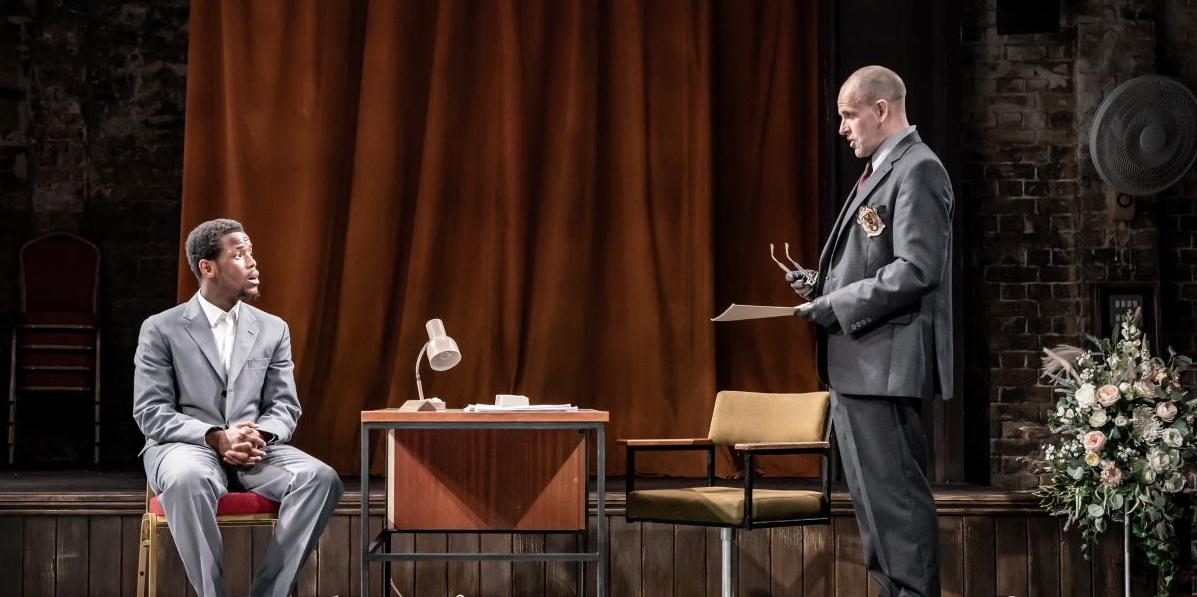When you arrive at the Almeida the foyer and the theatre are decked out for a wedding – flowers in pastel shades, a ceremonial arch, and enlarged photo of the bride and groom. Inside the theatre the conceit continues with an order of service on each seat, further floral displays, and groom and registrar and musician already in their places. Then we are asked to stand for the bride’s entry. But five minutes or so into the ceremony the focus shifts suddenly. The set is cleared away and the registrar announces that the wedding is simply a cover for an underground theatre performance of a banned play exploring censorship, the nature of authorship, and how far writers do or not owe a responsibility to state as opposed to the society in which they live.
Much of the action is set in the Ministry of Culture of a totalitarian state engaged in regular war with its neighbours. Adem, a mechanic turned writer, has been hauled in to meet the Director of the Ministry, Celik, who aims to be more than simply a cultural nay-sayer. He spots promise and though he bans Adem’s naturalistic account of his neighbours, encourages him to develop more patriotic work. Instead Adem produces effective transcriptions of his debates with Celik, which both meet the target and undermine the censor simultaneously. Bax, a writer who has conformed to the ministry’s diktats is added to the mix and much of the central action of the play consists in alternating scenes from the work of the two authors, read by the four characters in the core play. This is consistently engaging stuff, full of interesting points about writing technique, mordant humour at the expense of the regime they find themselves part of, and funny, plausible character-driven dialogue, all a bit reminiscent of the thought-world of ‘The Master and Margarita.’
I am not really persuaded by the elaborate framing device. Yes, it does permit some elaborate twists and turns in the plotting of the final section, but a more straightforward production stripped of these trappings would have been shorter and even more compelling. Two hours is a Wagnerian length of time without an interval: if half an hour had disappeared the key points would have come across just as memorably.
That said, the acting was uniformly excellent. It was good to see Jonny Lee Miller back on stage as Celik. He is a naturally commanding presence, but we also witnessed very clearly the conflict of emotions and motives within this character, so that when final revelations came, they were both surprising and prepared for. Much of the comedy in the action came from Tanya Reynolds as Mei. As the awkward, stilted reader of play texts and gauche office flunky she was entirely convincing; and in the final stages she finds a dry, disdainful defiance that completes our sense of the character’s identity. Micheal Ward, in his stage debut, transmitted the naive innocence of the author but also more than held his own in the debates with Celik and Bax. Geoffrey Streatfeild gave a richly detailed performance as the latter, whether as compromised dramatist or lecherous drunk; and the minor roles, representing agents of the state, were taken with convincing thuggishness.
As indicated the setting was impressively flexible, and director Jeremy Herrin ensured that the action flowed freely despite the variations of format. Cellist Miriam Wakeling deserves a special mention for providing a musical underscore throughout pretty much the whole evening, ranging from Bach to free improvisation, providing an evocative and elegant counterpoint to the main thrust of the play.
As a drama this play is a bit too tricksy for its own good; but as a thoughtful and thought-provoking meditation on the realities of state and self-censorship in the modern world it is outstanding.

